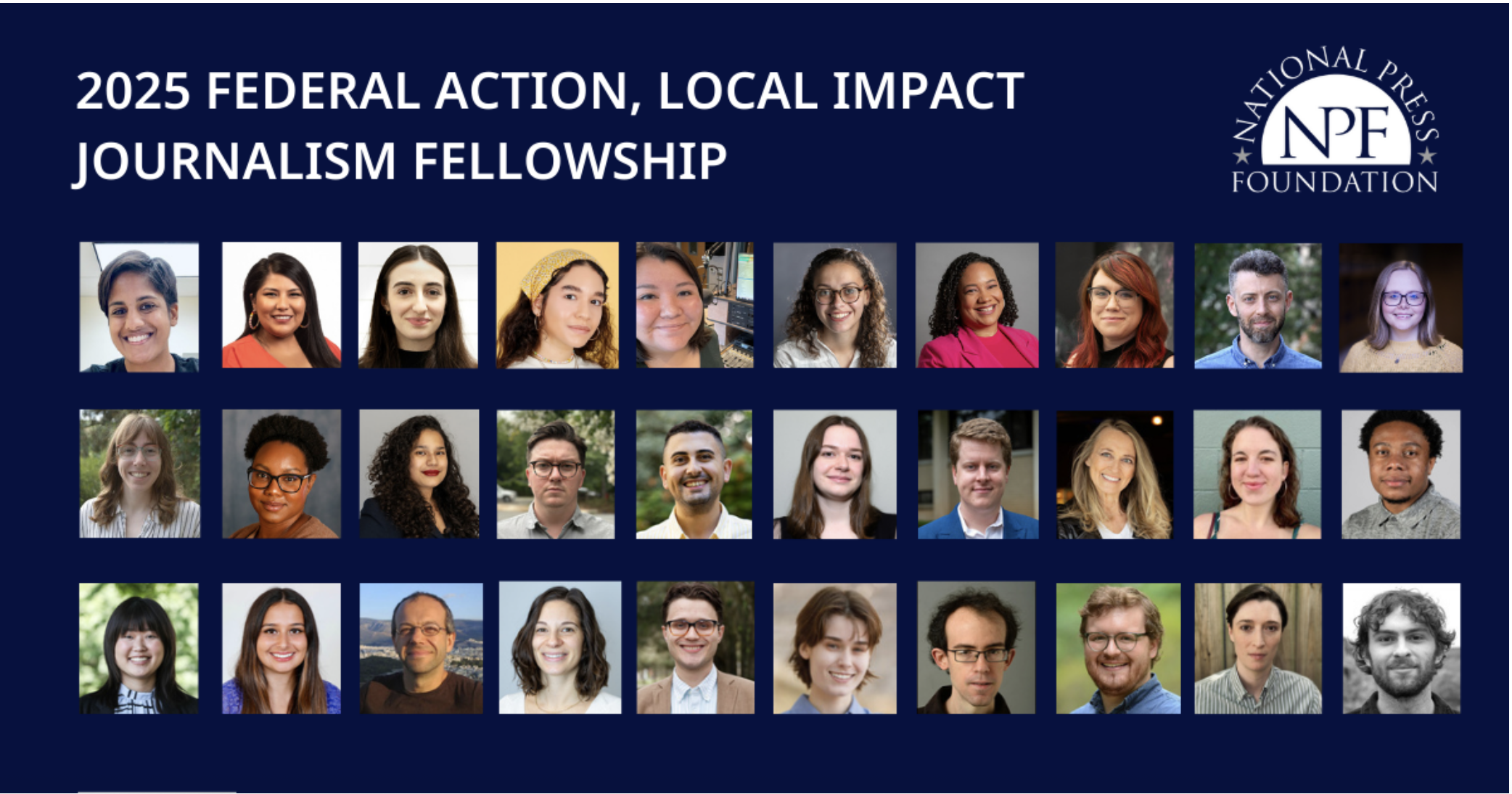The Edge is going to Washington
NPF Fellowship will boost local coverage of Trump administration changes to healthcare, land use, other issues, plus: SAVE THE DATE!

Greetings, Friends.
First, a hearty welcome to all the new members of The Edge community, folks who subscribed at last weekend's Spoonbread Festival. I am delighted I got to meet most of you in person, and if it was not me who spoke with you, it was one of The Edge's fantastic Board members, who were also was happy to meet you, and share their love of The Edge.
Our $300 booth at Spoonbread was sponsored in part by a $20,000 grant from The Listening Post. The grant also covers my time, among other expenses, as I survey the community to learn what it is about local land use law that concerns—or excites—you most. This project began in June and will go through next Spring.
What I learned from those of you who shared your thoughts were that increased traffic, the arrival of Madison County's first distillery, and a disorganized court system intent on fining instead of adjudicating are some of the issues top of mind. The Edge has already been covering the distillery, and will look into the claims about the court.
As for traffic, there have been hints at it in The Edge, but not outright coverage. One state transportation cabinet project that is to do with traffic is the airport expansion project, which includes a road to be built through a family's farm. The Edge has all the details.

Coming coverage, NPF fellow
There are few words to describe the thrill I felt when I received news that I was named as a National Press Foundation Local News Fellow. As such, The Edge will be part of a cohort of 30 local news outlets from across the country, invited to Washington, DC, this fall to meet with representatives from Capitol Hill, and other policy experts, for the sake of learning how the current administration's moves to cut the federal budget will directly impact local communities.
As a former DC-based federal health policy and health economics reporter for a few different publications, I will be interested to learn what rural hospital and Medicaid funding changes will most impact Bereans and Madison Countians.
I expect to explore what will happen if our local Saint Joe's will indeed close, as it is slated to now, and how changes to Medicaid will impact access to care in our community. Most likely, there will be serious changes to how many Bereans and others in the County access mental health services, and I will cover that.
Since I also cover land use, I have signed on to learn what changes are occurring to logging regulations, since we live along and within the Daniel Boone National Forest. As coverage details emerge, you will be the first to know!
Lastly, The Edge also has been invited to participate in a symposium hosted by the Reynolds Journalism Institute at the University of Missouri, on how local news can help provide solutions to intractable problems facing the community. The symposium will be held in November at MirrorIndy, Indianapolis's own independent, online news outlet.
A small stipend will be awarded to all participants of this symposium to help with implementing whatever solutions are needed locally. If you have thoughts on community issues you think The Edge could help to improve, please let me know: editor@theedgebereaky.com.

Police academy, BJJ
Also this fall, in anticipation of possibly adding a police beat to The Edge, I have been participating in the Citizen's Police Academy at EKU's School of Criminal Justice. Part of the curriculum on how law enforcement works, in the coming weeks, I will be going on ride-alongs with a Kentucky State Trooper as well as with a local Berea Police Department officer. I will report on these experiences as part of the Meet Your Municipality section of The Edge.
Next month, I will complete a MacArthur Foundation sub-grant, awarded to me by the Tiny News Collective (see more about TNC below), for executive training. I applied the grant to Brazilian Jiu Jitsu classes, primarily for some lessons in self defense. What I also have gained, however, is better time management skills and a group of great guys to hang out and "roll" with.
The former is because left to my own devices, I will work until I drop, day and night. But knowing I have a two hour class in the evening, I have to be better at finishing my work before dinner. The latter is not just about enjoying a social scene, but as the only woman in the school, it's about having the discipline to keep up with the guys and not quit. That has been the most challenging because, if you didn't know this already, BJJ is freaking hard!
On The Edge, the podcast
It's been a lot of work, so your response will determine the fate of On The Edge, the podcast dedicated to exploring Berea and Madison County. Since The Edge online is focused more on local government and policy, the podcast is intended to cover local culture and politics. The first episode, currently in production, is a sort of local love letter to Bereans and some of the caring, thoughtful things you do without thinking twice, and the celebratory ones, too. Think Berea Urban Farm, Room in the Inn, the Appalachian Writer's Conference.
Dealing with 501c3 status question
The Edge is fortunate to have two support organizations in its corner. Since its founding, The Edge has been a member of the invite-only Tiny News Collective, a membership organization that costs $1,200 annually. In exchange, The Edge receives multiple benefits. These include website tech support, access to a robust list of funding opportunities, and fiscal sponsorship, among other perks.
A word about that last one, fiscal sponsorship. A year ago, when The Edge was founded, my accountant applied to the IRS for nonprofit status. That's because my intention was to operate as a news source that would be similar to public radio: free to all, with membership drives to help cover costs. Grants and donations, too, would help flesh out the finances. Well, that's not happening, at least not so far.
The IRS, like it nor not, has been gutted by this administration. Not only does that mean that tax returns are not being processed in a timely manner, other IRS functions like managing nonprofit filings are essentially kaput. There has been absolutely zero movement on my application, nor any communication about when it might be approved, or even not approved.
So, I am in a quandary. Should I just keep paying 3% of all my grants and gifts to TNC to act as my nonprofit umbrella so I can continue to accept tax deductible donations, or declare that I am a for-profit organization? This essentially would mean pulling out of the fiscal sponsorship program, and focusing on advertising as much as anything else.

Business support organizations
I do not know what to do. In any case, it's not prudent for me to wait on the IRS any longer, so in order to get help with creating a sustainability plan, I have done two things. I have been working with the local chapter of the Small Business Development Center out of London, which I have found to be very personalized and attentive to my needs.
The SBDC is a tax-funded federal business program (so it's "free") that will meet you wherever your small business needs are. They're the ones who suggested, strongly, that since I am good at interviewing folks, I should make hay from doing it on a podcast, and make it for paying members only.
We'll see, but I really appreciated the time and thought these guys put into helping me. They also administer small business, low-interest loans, but I haven't wanted to borrow money.
I also applied and was accepted into the nonprofit member organization, LION (Local Independent Online News), whose mission is to help local indy news publishers like The Edge become sustainable. I will have access to consultants from both the nonprofit and for-profit worlds for $140 annual dues.
What I hope to get from both the SBDC and LION is help determining what the right business model is right for my circumstances, now that I know that The Edge is viable.
Lord knows, I have been crap at selling and maintaining advertising/sponsorships. There are a few reasons for this, but the primary one is that I would rather report the news, and that takes time and is driven by deadlines.
Selling and managing accounts, therefore, does not get the kind of attention it deserves and necessitates for advertisers to feel confident they are making the right decision by investing their ad dollars with The Edge. So, I have been reluctant to do it and risk people being disappointed in me.
However, it's not unusual for people who understand that print is not the only way to go with reaching a buying public—The Edge does have an average of 20,000 readers or more each month, after all—to approach me about ads/sponsorships, so I do have them, and when I remember to view the analytics for them, it's clear they do reach the intended audiences.
Press Forward Appalachia, Bluegrass: what is news for?
The Edge recently was invited to participate in two focus groups for the Appalachian and Bluegrass chapters of Press Forward, a relatively new foundation dedicated to supporting local journalism.
Speaking from my own experience as a local publisher, I suggested that funding dedicated specifically to helping news org's cover their overhead were too scarce. That is what I need, and that has not been easy for me to find, and not for lack of looking hard for them.
The other suggestion I made was in response to some opining that there is not a demand for news the way there once was. From my own experience of participating in press conferences for the national media, and seeing first hand how corporate media operates, which is not good, local news can't assume that our audiences want what we have.
If all they've been exposed to is meaningless hype around situations they can do nothing about, and in fact, just make them feel hopeless, then of course they don't want to "consume" news.
Through practicing our craft, we have to re-educate citizens, or in the case of younger people, educate them, about how knowing the facts about their community can really enhance their experience of it, make them feel more accountable to it. And we have to demonstrate that is what we are offering them.

SAVE THE DATE!
Okay, thanks for reading this to far. Here's the reward for your attention: a party! November 2, 4pm!
Councilwoman and proprietor of Native Bagel, Katie Startzman, has graciously offered her restaurant as a venue to host a gathering of friends of The Edge. that's the address up there: 436 Chestnut Street.
We will use the space, but in traditional Berea fashion, we will have a potluck. There will be cake because: it will be The Edge's One Year Anniversary!
During that time, The Edge has published 131 stories that have kept folks up to date on the Big Hill Line, shown that the school superintendent was not corrupt but also not competent, and that the pool wouldn't open this year (our most read story ever!). We've also covered every single Berea City Council meeting since November 2024, and recently began covering the Fiscal Court. Why? Because this is a special, unique community and its stories and happenings deserve to be told.
It will be an "ask me anything" event. Plus, I want to hear from you what you like about The Edge, what you don't, and what kinds of coverage you'd like to see more of. Here's the catch: this event is for paid members only.
If you're a paid member and you're planning on coming, please RSVP here:
If you'd like to come but are not currently a paid member of the community, here's where you can become one:
It is my pleasure and privilege to serve this community.
Whitney McKnight,
Publisher, The Edge

